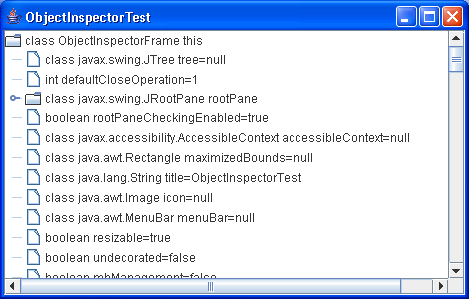This program demonstrates how to use a custom tree model. It displays the fields of an object

/*
This program is a part of the companion code for Core Java 8th ed.
(http://horstmann.com/corejava)
This program is free software: you can redistribute it and/or modify
it under the terms of the GNU General Public License as published by
the Free Software Foundation, either version 3 of the License, or
(at your option) any later version.
This program is distributed in the hope that it will be useful,
but WITHOUT ANY WARRANTY; without even the implied warranty of
MERCHANTABILITY or FITNESS FOR A PARTICULAR PURPOSE. See the
GNU General Public License for more details.
You should have received a copy of the GNU General Public License
along with this program. If not, see <http://www.gnu.org/licenses/>.
*/
import java.awt.BorderLayout;
import java.awt.EventQueue;
import java.lang.reflect.AccessibleObject;
import java.lang.reflect.Field;
import java.lang.reflect.Modifier;
import java.util.ArrayList;
import java.util.EventListener;
import javax.swing.JFrame;
import javax.swing.JScrollPane;
import javax.swing.JTree;
import javax.swing.event.EventListenerList;
import javax.swing.event.TreeModelEvent;
import javax.swing.event.TreeModelListener;
import javax.swing.tree.TreeModel;
import javax.swing.tree.TreePath;
/**
* This program demonstrates how to use a custom tree model. It displays the fields of an object.
* @version 1.03 2007-08-01
* @author Cay Horstmann
*/
public class ObjectInspectorTest
{
public static void main(String[] args)
{
EventQueue.invokeLater(new Runnable()
{
public void run()
{
JFrame frame = new ObjectInspectorFrame();
frame.setDefaultCloseOperation(JFrame.EXIT_ON_CLOSE);
frame.setVisible(true);
}
});
}
}
/**
* This frame holds the object tree.
*/
class ObjectInspectorFrame extends JFrame
{
public ObjectInspectorFrame()
{
setTitle("ObjectInspectorTest");
setSize(DEFAULT_WIDTH, DEFAULT_HEIGHT);
// we inspect this frame object
Variable v = new Variable(getClass(), "this", this);
ObjectTreeModel model = new ObjectTreeModel();
model.setRoot(v);
// construct and show tree
tree = new JTree(model);
add(new JScrollPane(tree), BorderLayout.CENTER);
}
private JTree tree;
private static final int DEFAULT_WIDTH = 400;
private static final int DEFAULT_HEIGHT = 300;
}
/**
* This tree model describes the tree structure of a Java object. Children are the objects that are
* stored in instance variables.
*/
class ObjectTreeModel implements TreeModel
{
/**
* Constructs an empty tree.
*/
public ObjectTreeModel()
{
root = null;
}
/**
* Sets the root to a given variable.
* @param v the variable that is being described by this tree
*/
public void setRoot(Variable v)
{
Variable oldRoot = v;
root = v;
fireTreeStructureChanged(oldRoot);
}
public Object getRoot()
{
return root;
}
public int getChildCount(Object parent)
{
return ((Variable) parent).getFields().size();
}
public Object getChild(Object parent, int index)
{
ArrayList<Field> fields = ((Variable) parent).getFields();
Field f = (Field) fields.get(index);
Object parentValue = ((Variable) parent).getValue();
try
{
return new Variable(f.getType(), f.getName(), f.get(parentValue));
}
catch (IllegalAccessException e)
{
return null;
}
}
public int getIndexOfChild(Object parent, Object child)
{
int n = getChildCount(parent);
for (int i = 0; i < n; i++)
if (getChild(parent, i).equals(child)) return i;
return -1;
}
public boolean isLeaf(Object node)
{
return getChildCount(node) == 0;
}
public void valueForPathChanged(TreePath path, Object newValue)
{
}
public void addTreeModelListener(TreeModelListener l)
{
listenerList.add(TreeModelListener.class, l);
}
public void removeTreeModelListener(TreeModelListener l)
{
listenerList.remove(TreeModelListener.class, l);
}
protected void fireTreeStructureChanged(Object oldRoot)
{
TreeModelEvent event = new TreeModelEvent(this, new Object[] { oldRoot });
EventListener[] listeners = listenerList.getListeners(TreeModelListener.class);
for (int i = 0; i < listeners.length; i++)
((TreeModelListener) listeners[i]).treeStructureChanged(event);
}
private Variable root;
private EventListenerList listenerList = new EventListenerList();
}
/**
* A variable with a type, name, and value.
*/
class Variable
{
/**
* Construct a variable
* @param aType the type
* @param aName the name
* @param aValue the value
*/
public Variable(Class<?> aType, String aName, Object aValue)
{
type = aType;
name = aName;
value = aValue;
fields = new ArrayList<Field>();
// find all fields if we have a class type except we don't expand strings and null values
if (!type.isPrimitive() && !type.isArray() && !type.equals(String.class) && value != null)
{
// get fields from the class and all superclasses
for (Class<?> c = value.getClass(); c != null; c = c.getSuperclass())
{
Field[] fs = c.getDeclaredFields();
AccessibleObject.setAccessible(fs, true);
// get all nonstatic fields
for (Field f : fs)
if ((f.getModifiers() & Modifier.STATIC) == 0) fields.add(f);
}
}
}
/**
* Gets the value of this variable.
* @return the value
*/
public Object getValue()
{
return value;
}
/**
* Gets all nonstatic fields of this variable.
* @return an array list of variables describing the fields
*/
public ArrayList<Field> getFields()
{
return fields;
}
public String toString()
{
String r = type + " " + name;
if (type.isPrimitive()) r += "=" + value;
else if (type.equals(String.class)) r += "=" + value;
else if (value == null) r += "=null";
return r;
}
private Class<?> type;
private String name;
private Object value;
private ArrayList<Field> fields;
}
Related examples in the same category